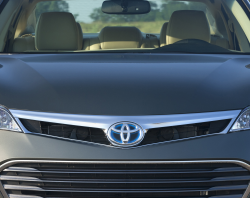— A Toyota hybrid class action lawsuit continues in court as vehicle owners try to convince the judge the lawsuit adequately alleges there are defects in the brake boosters and brake booster pump assemblies.
The class action alleges more than 1 million of these hybrid vehicles are affected.
- 2010-2015 Toyota Prius
- 2010-2015 Toyota Prius PHV
- 2012-2015 Toyota Prius v
- 2012-2014 Toyota Camry Hybrid
- 2013-2015 Toyota Avalon Hybrid
Several Toyota hybrid class actions were filed and consolidated in Texas, but all the lawsuits allege the hybrid vehicles should have been recalled long ago. A Toyota and Lexus brake booster recall was announced in 2019, but the recalled models didn't include older vehicles.
The plaintiffs claim Toyota knows the vehicles suffer from brake problems because dealerships have been warned about owners who complain about their vehicles.
The hybrid class action says Toyota created customer support program ZJB in August 2018 to replace the brake boosters and pump assemblies for Prius cars.
The automaker also issued a technical service bulletin (TSB) in September 2019 for 2012-2014 Toyota Camry Hybrid and 2013-2015 Avalon Hybrid brake booster assemblies. TSB 0130-19 warned dealers the problem can occur from a small internal brake fluid leak in the brake booster assembly.
The lawsuit also alleges customer program ZKK expanded the brake booster repairs to 2012-2014 Toyota Camry Hybrid and 2013-2015 Toyota Avalon Hybrid vehicles.
However, the plaintiffs claim some of those operations came with conditions that could possibly cost Toyota hybrid owners money for testing and repairs.
Progression of the Toyota Hybrid Class Action Lawsuit
The original Toyota hybrid brake booster lawsuit was filed in January 2020 by plaintiffs Jason Medeiros and Nancy Bennett-Hauser (Medeiros v. Toyota).
About a month later, plaintiffs Laura Turner and Glenn Alcaraz filed a similar hybrid class action lawsuit against Toyota (Turner v. Toyota).
Three days later, plaintiff Mariano Alaniz filed a hybrid class action lawsuit against Toyota (Alaniz v. Toyota).
In February 2020, Chong Eun, Stephanie Owens, Enrique Pabon, Bryan Feinberg, David Siegal, Gregory Vasquez, Madeline Vasquez and Lois Felts filed a Toyota hybrid class action suit (Eun, v. Toyota).
Then in March 2020, Willie Rose and Jeffrey Warner Rasco filed their own hybrid class action lawsuit in Texas (Rose v. Toyota).
Also in March 2020, the Medeiros/Bennett-Hauser lawsuit and the Turner/Alcaraz class action were voluntarily dismissed, but the plaintiffs reappeared later in the current version of the Toyota hybrid brake lawsuit.
Three days after the voluntary dismissals, Yvette Winia, Raul Rivera, Cristina Rivera and Kamran Khan filed a hybrid class action (Winia v. Toyota).
In April 2020, plaintiffs in three of the lawsuits filed a motion to consolidate the class actions, and on that same day plaintiff Bonnie Hendricks filed a Toyota hybrid class action lawsuit similar to those previously filed in other courts (Hendricks v. Toyota).
The current master hybrid lawsuit also includes plaintiff Nancy Kwan who originally filed her Toyota hybrid brake booster lawsuit in May 2020 (Kwan v. Toyota).
Judge Amos L. Mazzant dismissed part of the brake booster class action lawsuit in July 2021, and the plaintiffs filed a new amended lawsuit less than a month later.
The current class action is titled, In Re: Toyota Hybrid Brake Litigation, filed in the U.S. District Court for the Eastern District of Texas, Sherman Division.
CarComplaints.com will update our website with results of the Toyota hybrid lawsuit.

